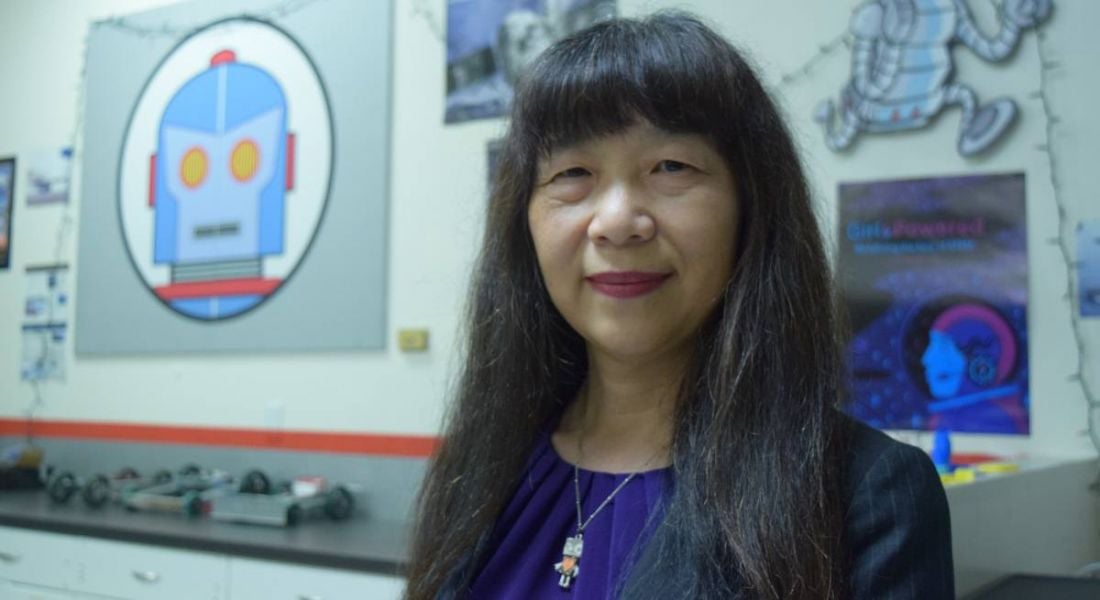Bing Jiang’s passion for STEM education led her to start Rolling Robots, where she aims to teach kids about robotics and inspire future generations.
Rolling Robots is the brainchild of Bing Jiang and her husband. They first set up a retail shop in California 12 years ago, giving children a space to build robots and learn about STEM. It had robot products for sale, an area for birthday parties, and even had a robot arena where kids could build and battle – and potentially develop an interest in engineering and inventing.
Jiang had a background in physics and a passion for helping kids, and with her husband’s love for robots, they found their calling. “Having our son, who is very interested in building things, we had a built-in test subject and an extra internal drive to give the idea a go,” she said.
“Now, we have three locations in the greater Los Angeles area, serving thousands of children each year on robot-building birthday parties, after-school workshops, and robotics and STEM summer camps. Our VEX robotics competition teams qualified for the world championships in the past seven years, [and have won] the Excellence Award, which is the highest award a team can receive in the VEX Robotics World Championship.”
Jiang’s interest in STEM started early. “Physics was one of my favourite classes in high school. My physics teacher was a woman. She was very thoughtful and energetic,” she said. “Learning about the fundamentals of how everything works were fun to me. This background in physics helped me years later in my engineering career and being an entrepreneur in this business of helping children learn robotics.”
‘I experienced first-hand that teaching is ineffective when your students are not interested in learning the subject’
– BING JIANG
Jiang moved from China to America after graduating from university with a degree in applied physics. Two years later, she was in her first job in the US, teaching college students astronomy in the university where she received her master’s degree in physics.
“My professor at the university trusted that I could do the job. It helped me so much in learning about myself. I am passionate about helping people learn. However, I also experienced first-hand that teaching is ineffective when your students are not motivated or not interested in learning the subject.”
She said landing her first full-time job was largely due to her determination to get work before her visa ran out, and she was fortunate to be interviewed by the president of a small research and development company who was also a physics major and saw her potential. “I learned everything on this job, from spoken English to a variety of test equipment and the advanced devices in high-vacuum, high-voltage applications,” she said.
“I loved the fast pace and dynamic environment of the job. It called on me to learn new skills quickly and solve a wide range of problems because it is a very small business on a very small budget. This job was the start of my first career as an engineer.”
What needs to change in STEM education
STEM has come a long way and conversations around the development of STEM education have changed and become more important. Today’s children have more opportunities than ever before to learn about science and tech. However, Jiang said the challenge is engaging them and guiding them onto the path to continue their STEM education.
“The change I would like to see is that children are provided with an environment where they are stimulated by abundant information and materials that are suitable for their mental developmental level,” she said.
“They are encouraged to freely explore based on their interests. They learn creatively, collaboratively and competitively with the goal to advance their own abilities in a field that they are most passionate about. Kids love robots. Kids love hands-on activities. Kids learn well when they are happy.
“The purpose of children’s education is to prepare them for their life when they become independent adults. Besides basic reading and counting, any further education is a process of sharing the accumulated human knowledge to children so they can continue and advance our civilisation. With the exponential advancement of technology, our children need to learn about new technologies while they are being invented.”
Jiang added that learning robotics involves learning every aspect of STEM and also challenges young people to create a physical robot that is structurally sound and can complete tasks autonomously.
“In addition to learning the theory, they learn how to apply the theory in robotics. They also learn how to work within a team and skills such as technical writing, strategic planning, negotiation and presentation. The benefits of learning robotics at a young age are so great that every kid between age five and 15 should have the opportunity to experience it.”
Covid-19 forced Rolling Robots to pivot to online workshops and camps, but Jiang said the response has been very positive. “Parents are excited about online opportunities. We are able to offer more choices online to meet the demands of a variety of interests. It’s exciting to know that children across the nation can take our online summer camp,” she said.
“It is so rewarding for me to see many children found Rolling Robots when they were young and we have the opportunity to help them grow into the next generation of technology leaders. Knowing that I have helped so many kids get an early start in finding their passion for robotics, I am content.”
Want stories like this and more direct to your inbox? Sign up for Tech Trends, Silicon Republic’s weekly digest of need-to-know tech news.




